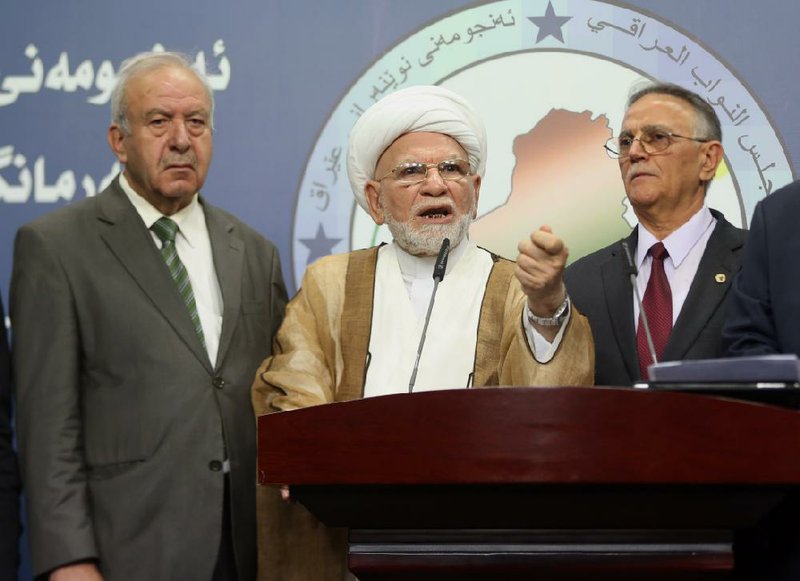WASHINGTON -- Senior U.S. officials and lawmakers butted heads Wednesday over the American response to Iraq's expanding Sunni insurgency, with Republicans saying drone strikes should have been authorized months ago and even Democrats questioning the commitment of President Barack Obama's administration to holding the fractured country together.
Brett McGurk, the State Department's deputy assistant secretary for Iraq and Iran, and Elissa Slotkin, McGurk's counterpart at the Defense Department and a former Iraq director for the National Security Council, testified before the House Foreign Affairs Committee on Wednesday.
The pair said Obama's administration knew an attack was in the works three days in advance of the Islamic State extremist group's offensive in northern Iraq, but U.S. efforts to mount a response were hampered by the Iraqi government's insistence that it could handle the threat.
They said the U.S. administration is now focused on improving U.S. intelligence, securing American personnel and property, guiding Iraq toward a new, more inclusive government, and helping its forces strike back against the Islamic State.
The U.S. is now conducting about 50 intelligence sorties over Iraq a day, they said, from about one flight a month a few months ago. Both stressed they saw no military solution to patching up Iraq's political and ethnic divisions or to peeling off moderate Sunnis from the insurgency.
Republicans and Democrats accepted that point, but questioned why the administration wasn't doing more.
Rep. Ed Royce of California, the Republican chairman of the committee, recalled a hearing six months ago when U.S. officials said the extremists must be "constantly pressured and their safe havens destroyed" so that they "never again gain safe haven in western Iraq." Yet since that time, the insurgents have seized vast swaths of territory and a series of towns and cities, including the second-largest city of Mosul.
"What the administration did not say was that the Iraqi government had been urgently requesting drone strikes against [Islamic State] camps since August 2013," Royce said. "These repeated requests, unfortunately, were turned down."
McGurk, who spent the past seven weeks in Baghdad, said Iraqi drone requests hadn't been rejected, because they were still being studied, an answer that prompted derision from Royce. McGurk also suggested Iraqi requests have sometimes been informal and contradictory.
In Iraq on Wednesday, the parliament postponed its presidential vote by a day. After the selection of the president, the parliament must tackle appointing a prime minister, who will then name a government. Prime Minister Nouri al-Maliki's bloc won the most seats in April parliamentary elections, but his critics have accused him of monopolizing power and alienating the Sunni and Kurdish minority groups.
Al-Maliki has for weeks been resisting growing pressure to step aside. On Wednesday, he rejected an attempt by top ally Iran to persuade him to drop his bid to stay in office.
Pressed by lawmakers, McGurk refused to say whether al-Maliki should step aside.
Amid all the internal strife, Iraq's Kurds have pushed into disputed territory, including the oil-rich area of Kirkuk, and moved closer to a decades-old dream of independence. The U.S. has been trying to keep Iraq whole, but Democrats and Republicans wondered why.
Rep. Eliot Engel of New York, the top Democrat on the panel, questioned why the Kurds, as a distinct people, aren't entitled to the same rights of self-determination the Palestinians enjoy.
Rep. Dana Rohrabacher, R-Calif., said the United States shouldn't be limited by Iraqi borders drawn up by the British Empire a century ago. He suggested an independent Kurdistan and a sovereign Baluchistan ought to be considered.
Slotkin said a strong, capable government in Baghdad posed the best defense against the extremist insurgency. She implied that the country's breakup might mean the abandonment of territories controlled by the Islamic State.
"Who's in charge of that western and north part of Iraq in that model?" she asked.
Elsewhere on Wednesday, the top United Nations envoy in Iraq urged the U.N. Security Council to demand that the Islamic State stop all hostilities and atrocities.
Nickolay Mladenov called on all U.N. member states to cooperate in enforcing sanctions against the group and bringing to justice "the perpetrators, organizers and sponsors of these horrific terrorist acts, war crimes and crimes against humanity."
The Sunni extremist group now controls critical infrastructure, oilfields and pipelines and is well-financed with some $450 million from the Iraqi Central Bank in Mosul. It captured Mosul early on and is cleansing the city of all Christians in its campaign to create a permanent state beyond government control "through terror and violence," Mladenov said.
"They pose a direct threat to vital infrastructure, including the Beiji refinery and a number of air bases, access to which would substantially increase their financial and security resources," Mladenov said.
He said any security plan must be broadly accepted "across the political, sectarian and ethnic divide" and must be implemented by the Iraqi government and the Kurdish regional government.
"Everyone should stand together against terrorism," he said.
Information for this article was contributed by Qassim Abdul-Zahra, Vivian Salama, Sinan Salaheddin, Sameer N. Yacoub staff members of The Associated Press and by Hannah Allam, Roy Gutman and Sahar Issa of McClatchy Newspapers.
A Section on 07/24/2014


